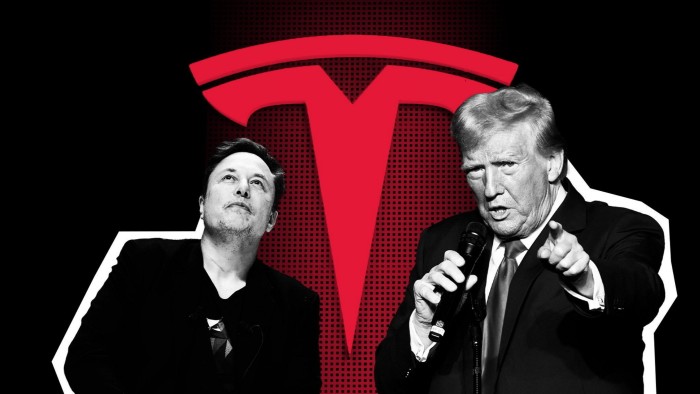Donald Trump’s criticism of electric vehicles looks likely to lead to the end of government subsidies for consumers who buy them, boosting Elon Musk’s Tesla by hitting its rivals with greater losses.
The president-elect has said EVs would spell “complete obliteration” for the US car industry, even as adoption for the vehicles has climbed in other parts of the world, particularly China. Trump said in July when he accepted the Republican nomination that he would “end the electric vehicle ‘mandate’ on day one”, referencing proposed emissions rules that President Joe Biden’s administration had eased four months earlier.
While Tesla is making money from its EVs, rivals’ losses on them have been narrowed by consumer tax credits worth up to $7,500 under Biden’s Inflation Reduction Act.
“A Trump presidency would be an overall negative for the EV industry,” said Wedbush analyst Dan Ives. “However, for Tesla, we see this as a huge positive.”
Tesla has added $300bn in market capitalisation since election night, a figure which surpasses the combined market value of Ford, General Motors and Stellantis, said Deutsche Bank analyst Edison Yu.
Consumer tax incentives benefit Musk’s rivals more because Tesla profits from its battery-run cars and trucks, while EVs generate losses for other US carmakers. The consumer tax credits cut those losses, and a so-called “loophole” for leased EVs generally guarantees the largest possible credit.
Most vehicles that consumers buy outright are ineligible for the full subsidy because many of their components or materials are sourced from China. But those requirements do not exist for leased vehicles, which has led to an explosion in leasing EVs.
Tesla prefers to sell its models rather than to lease them, to sidestep the risk of dropping residual values, said Jessica Caldwell, executive director of insights at Edmunds.
However, many carmakers selling in the US have priced their EVs with the tax incentive in mind, and the larger the subsidy — which the “leasing loophole” maximises — the more the product will appeal to consumers. Without the subsidies, carmakers could be forced to lower their prices and widen their losses, or risk losing some customers altogether.
GM chief executive Mary Barra said the company will turn a profit on EVs by the end of the year. Because Tesla is the only US carmaker currently doing so, it benefits from rivals’ increasing losses without suffering itself.
“Take away the subsidies,” Musk posted in July on X, the social media site that he owns. “It will only help Tesla.”
Trump’s election also could lead to swifter regulatory approval for autonomous driving technology, helping Tesla and other groups developing self-driving cars.
Trump “could also accelerate some of the [full self-driving] and autonomous initiatives for Tesla” and competitor Waymo, Ives said.
The National Highway Traffic Safety Administration launched an investigation of Tesla last month after reports of four crashes that occurred during conditions of poor visibility while the autopilot “full self-driving” feature was engaged. One of the crashes was fatal.
The expected rollback of vehicle emissions regulations and petrol mileage standards under Trump will give legacy carmakers a lengthier transition period to battery-powered cars, giving them more time to continue selling cars and trucks with traditional engines.
Nothing will change for 18 to 24 months, but legacy carmakers, such as GM and Ford, are likely to feel the benefits, said Barclays analyst Dan Levy.
With fewer electric products on the market, Ford is expected to benefit more while “GM is further along on EVs, so their capacity is established, so they need EVs to work a little more than Ford right now”, he said.
The Environmental Protection Agency last year floated regulations that would have required two-thirds of carmakers’ fleets be electric by 2032. That target was eased in the agency’s final rule in March, and companies will have more time to meet it.
Trump also targeted the California Air Resources Board during his first administration and could do so again. The board has had a waiver since the 1960s allowing it to set its own, stricter emissions policy, and carmakers often follow its decisions because of the size of the market. In 2019, Trump’s administration sued the board to revoke the waiver, a lawsuit that was dropped when Biden took office.
Although the shift in policies under Trump points to a headwind against EVs, carmakers will continue to move towards greater electrification, having invested billions in plants, tooling, product development and marketing for the vehicles, say experts.
“No one is throwing EVs out,” Levy added. “This is all of the new product that automakers are planning. What this does is maybe changing the timing and the curve . . . If it’s not demand-driven, if there’s not the regulatory mandate, they won’t do it.”
The parts of EV policy that experts say are less threatened are the ones that benefit Trump’s allies. The production tax credit included in the IRA helped fuel carmakers’ expanding footprint, which included building new facilities in states such as Georgia, Tennessee and Michigan, which all voted for him.
“There’s so much investment already,” said Stephanie Valdez Streaty, director of industry insights at Cox Automotive. “[The production tax credit] is less vulnerable than the consumer credits.”
Read the full article here




